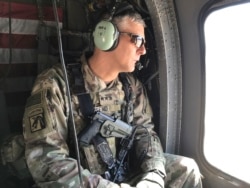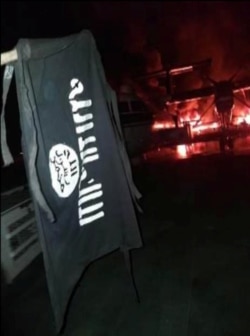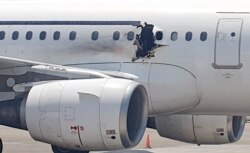Terror groups in Africa are getting more ambitious, increasingly mustering the resources and expertise to make their presence felt across the region with an eye toward wreaking havoc even further afield.
Intelligence assessments from the United States, Western nations and other United Nations member states point to a variety of factors, ranging from a small but critical influx of foreign fighters from Iraq and Syria to the growing profitability of drugs and weapons trafficking.
But sharp differences are emerging about the scope and nature of the threat, with U.S. officials alone publicly raising concerns that some of the African-based terrorists may be able to reach into Europe and the U.S. itself.
"The violent extremist organizations that are on the continent, both in the east and in the west, some of those groups threaten the American homeland today," General Stephen Townsend, the commander of U.S. Africa Command, told U.S. lawmakers during a recent hearing.
"Some of them will potentially be a threat in future," he added, warning, "we cannot take pressure off."
Al-Shabab: 'Our biggest target today is the Americans'
U.S. concerns have been spurred most recently by last month's deadly attack on the Manda Bay Airfield in Kenya, carried out by the Somali-based, al-Qaida affiliated terror group al-Shabab.
The attackers, U.S. officials said, demonstrated a surprising capability, overrunning the airfield's defenses. In the end, three Americans were dead while six aircraft lay in ruins.
U.S. forces in Kenya "were not as prepared there, at Manda Bay, as we needed to be," Townsend admitted.
U.S. officials also point to al-Shabab's own statements, the group's reclusive leader Abu Ubaidah declaring this past November that, "Our biggest target today is the Americans."
Regional or global threat?
But top counterterrorism officials outside of the U.S., while concerned, are not yet convinced that rhetoric or the ability to overrun an air base indicate al-Shabab or other terror groups in Africa are ready to flex their muscles on the global stage.
"In view of its increasing strength and the growing level of complexity of its recent operations, it appears possible that al-Shabab could conduct attacks, including on Western targets, in Eastern Africa," a European Union security official told VOA, speaking on the condition of anonymity due to the sensitivity of the intelligence. "However, we currently have no specific indications that these groups would focus on mounting attacks in the West itself."
It is an assessment shared, for now, by top United Nations terrorism officials.
"At the moment, there's no evidence of a present threat outside the immediate region," according to Edmund Fitton-Brown, coordinator of the United Nations' Analytical Support and Sanctions Monitoring Team, which tracks terror groups linked to al-Qaida and Islamic State.
International counterterrorism officials contend groups like al-Shabab remain focused on their home territories. And while they appear increasingly willing to take on Western targets, like the U.S. forces in Kenya or French troops stationed in Mali, the primary goal is to destabilize or collapse the region's fragile governments.
They also say there is also no evidence to suggest al-Shabab or the IS-linked groups are seeking to recruit and direct Westerners to carry out attacks in their home countries.
Officials admit, however, all of this could change.
"We should never be complacent about the external threat posed by armed extremist groups," the EU security official said. "[Islamic State] may instruct its affiliates in other parts of the world to plan attacks in Europe."
As an example of the potential threat, some counterterror officials point to a case involving a suspected al-Qaida terrorist that spanned Africa and East Asia.
In July 2019, authorities arrested a Kenyan national, Cholo Abdi Abdullah, who was taking flying lessons in the Philippines and who was looking to get expedited certification as a pilot.
Philippine police said Abdullah had been a member of al-Qaida since 2012, though they refused to release additional details.
"The very fact that that was even happening suggests an intelligence at work in al-Shabab that is at least looking at those more ambitious international ambitions," said the U.N.'s Fitton-Brown. "It would be right to continue to monitor it."
Threat capabilities
Al-Shabab is also no stranger to looking at aviation as a potential target, having claimed responsibility for a bombing that brought down a Somali airliner in 2016.
"It is very likely that they would have continued to try to develop this external attack capability and could likely leverage expertise from elsewhere in the al-Qaida network to do so," said Emily Estelle, with the American Enterprise Institute's Critical Threats Project.
"There is clearly concern," added Colin Clarke, a senior fellow at the Soufan Center, a global security research group.
Al-Shabab "has improved its ability to build devastating bombs, as evidenced by some of the spectacular attacks the group has launched since late 2017," he said.
Rise of African-based terror groups
Making matters more complicated are the number of African terror groups that seem to be on the rise.
According to the U.S. and U.N. member states, al-Qaida affiliated Jama'a Nusrat ul-Islam wa al-Muslimin, or JNIM, has emerged as a key threat in West Africa.
Boasting up to 2,000 fighters, mostly based out of Mali, JNIM has been building its financial reserves by taxing smugglers looking for safe passage through Mali. And, increasingly, the group has been displacing government agencies, providing critical services through its own "non-profit" organizations.
There are also growing concerns about the Islamic State affiliate in West Africa, known as IS in the Greater Sahara or ISGS.
Intelligence officials say the group maintains a stronghold in the tri-border area between Mali, Niger and Burkina Faso. Its fighters, also, have not been afraid to take on U.S. forces, killing four Americans and five Nigeriens while attacking a patrol in Tongo Tongo, Niger, in October 2017.
Global response
Some countries are recognizing the rising threat and responding.
France, which has taken the lead among Western countries in combating terrorism in the Sahel, recently committed to sending another 600 troops to the region.
The goal, according to a statement by French Defense Minister Florence Parly, is to "step up pressure" on ISGS, which she described as "an elusive, asymmetrical enemy."
Other countries are also mobilizing more troops to fight the terror threats in the Sahel, France saying it has already gotten commitments from Chad and the Czech Republic, and that it expects more nations to increase their commitments as well.
But some analysts warn Africa's terror groups are unlikely to back down because while European countries talk of adding forces, talk in the U.S. has focused on further reducing the American military footprint – or as U.S. Defense Secretary Mark Esper has described it, "right-sizing" the Pentagon's force posture.
"They (terror groups) are aware of the U.S. discussion on whether to withdraw troops from Africa," said Emily Estelle, with the American Enterprise Institute's Critical Threats Project.
"We need to consider that al-Qaida and its affiliates are attempting to manipulate the U.S. policy response," she added. "This could be an attempt to push the U.S. toward withdrawing troops from West Africa entirely, which would allow al-Qaida's affiliate JNIM to keep solidifying its influence there. The al-Shabab attacks likely have a similar goal for East Africa."








